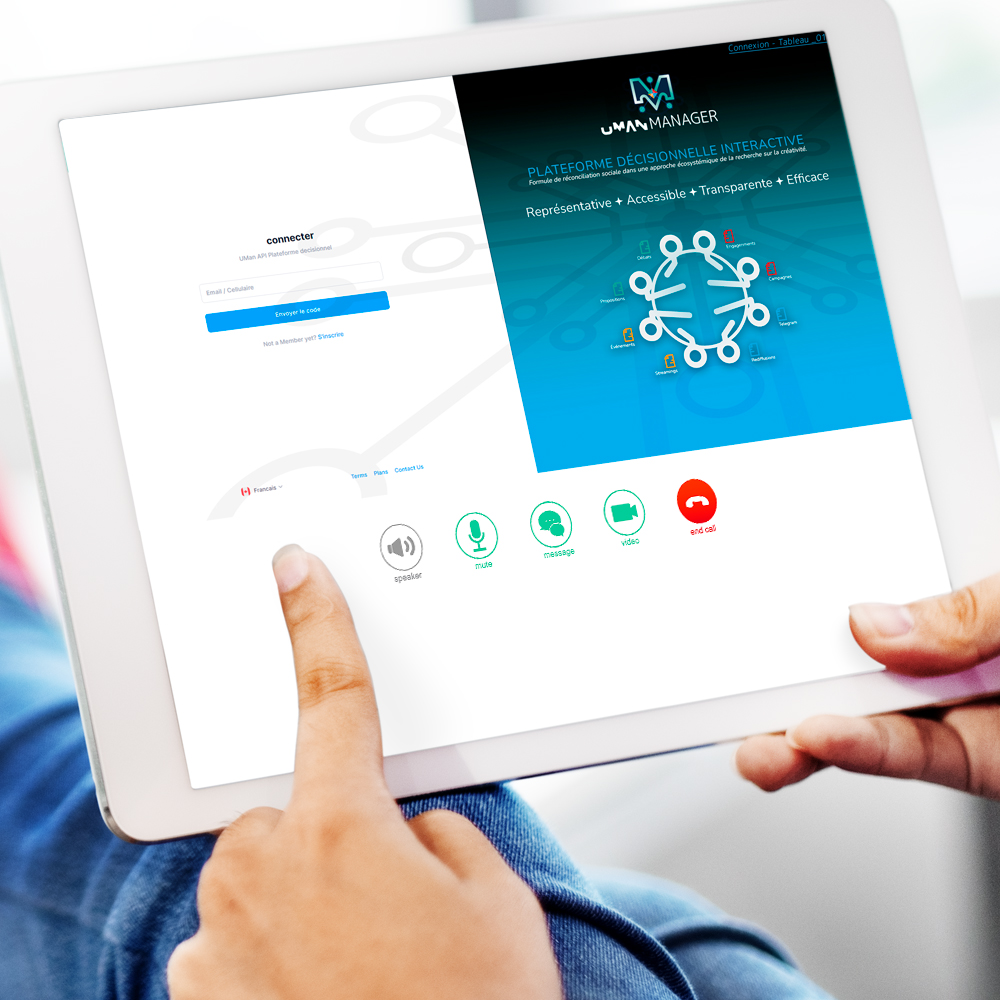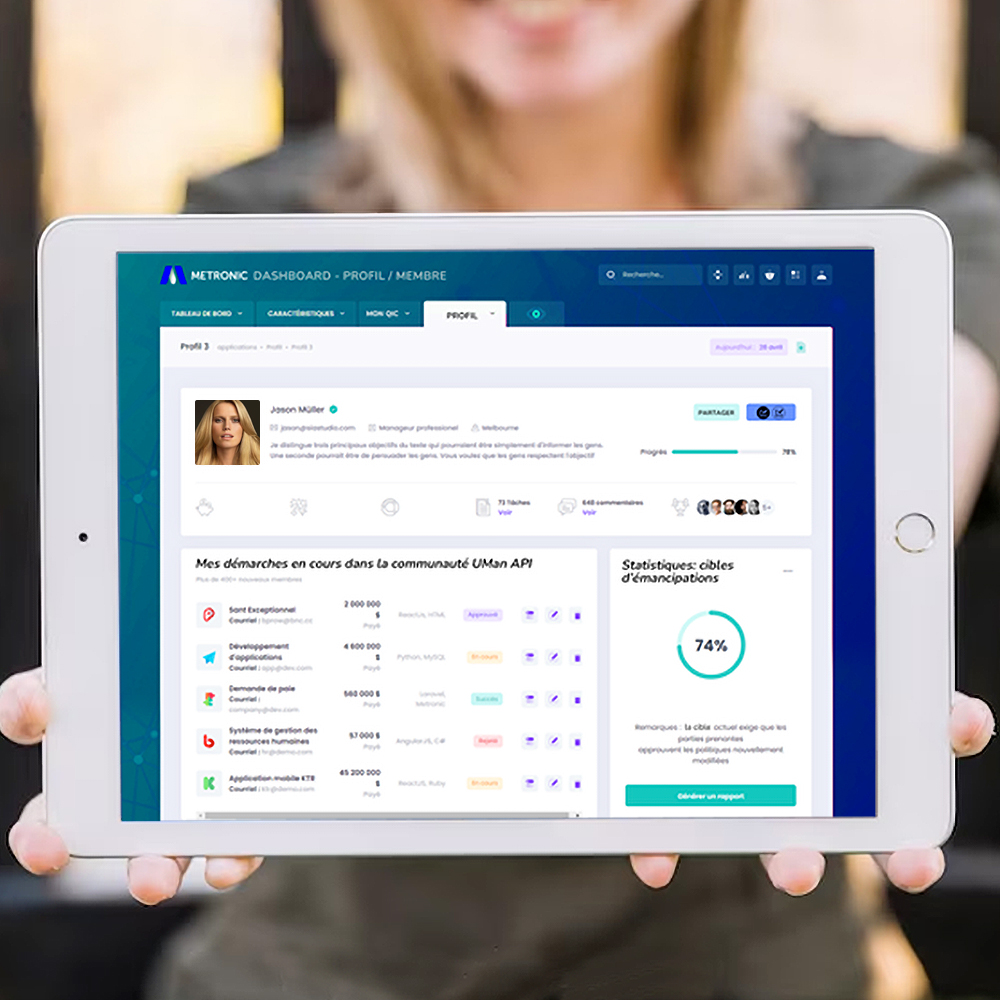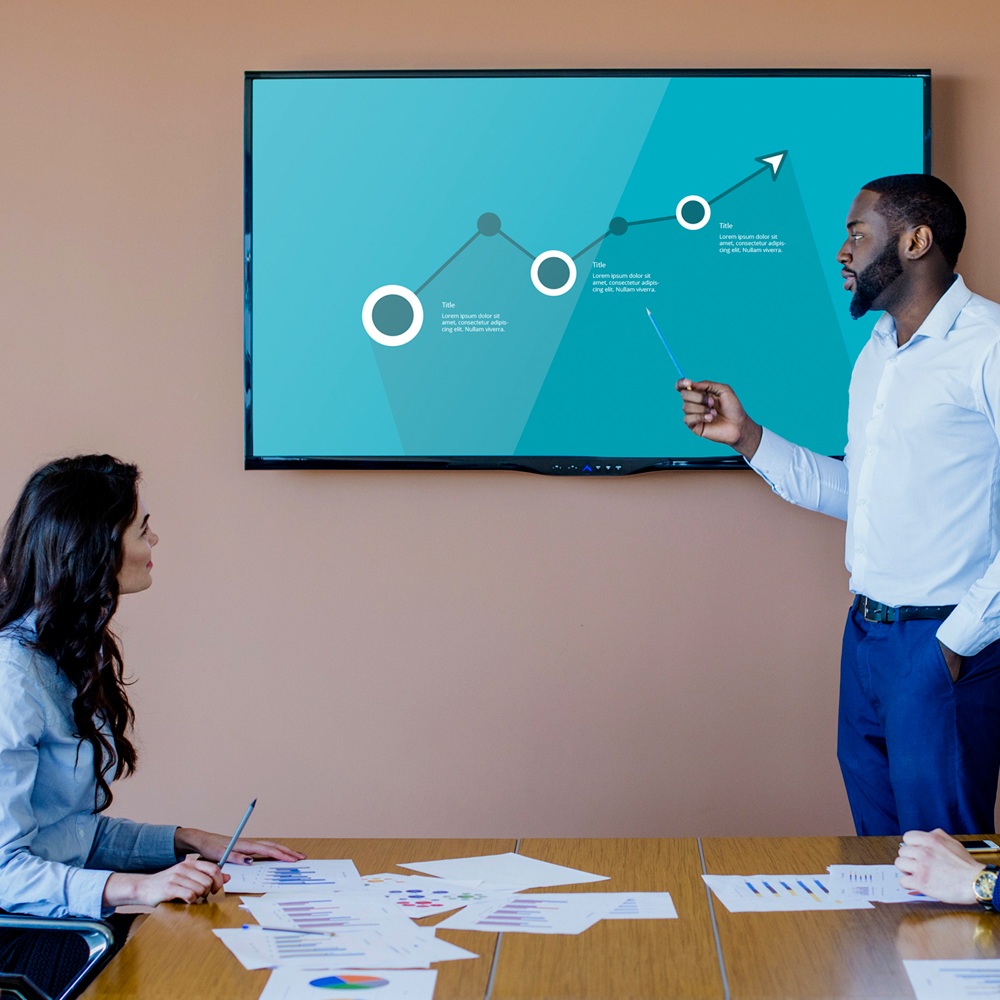DECISION-MAKING PLATFORM
in cyberdemocracy

Implementation of a social reconciliation formula and an ecosystem approach to research on creativity.
- Proposals and Cyberdemocracy at work









CYBERDEMOCRACY
Why use our platform?
Advice service
Profile - Dashboard
Modules
UMan Manager
Our consultants and experts are there to facilitate your processes and ignite the passion for engagement in your ecosystems!







« We firmly believe that it is essential to put democracy at the heart of all our activities. Let's promote greater involvement together for more transparent and collaborative work environments. »
Modules
Proposals
and very effective
Utilisateurs
participative democracy
Nos Agents UMan
de la recherche sur la créativité. Leur application aide les entreprises à augmenter l'efficacité de leurs prises de décision.
UMan API - Starter pack
more interactive and truly more dynamic!
The module "PROPOSALS, LAWS, REFERENDUM" is a citizen participation platform that encourages electronic voting and discussion on important topics. It has been adopted by several governments and organizations around the world to improve citizen engagement in your governance ecosystems.
Citizen Participation : This module provides a platform where citizens can propose ideas, discuss critical issues and have a direct impact on decisions.
Electronic voting : The module offers features that facilitate electronic voting, allowing users to give their opinion on various policy proposals or topics in a simple and accessible way.
Confidentiality of results : The results of the votes remain confidential, guaranteeing the anonymity of the participants and the integrity of the process.
Influence on decisions : The results of this module have a significant influence on the decisions taken, highlighting the importance of citizen participation.
Conflict Resolution : It can be used to resolve conflicts by allowing the parties concerned to express their opinion and thus contribute to decision-making.
Global adoption : It is used by many governments and organizations around the world, testifying to its effectiveness and reliability.
The Proposals module embodies the essence of democracy by enabling citizens to actively participate in decisions that affect them, whether it is the management of their business, the direction of their projects or the formulation of their citizen movements.
In short, it is the ideal tool for anyone who wants to involve people more in decision-making processes.
more efficient productivity!
The module "COMMITTEE, DEPARTMENT, APPROACH and ENGAGEMENT" is designed to improve and refine ongoing projects, especially those with a high degree of uncertainty. It allows proposals to be tested, evaluated and refined at each stage of development, ensuring the overall quality of the project.
With this tool, we foster increased collaboration within teams, improving communication and shared understanding of goals and expectations. This module promotes an iterative approach with fast feedback cycles, speeding up the development process and optimizing productivity.
By encouraging the active engagement and participation of team members, the Committee module will stimulate motivation and satisfaction, making each member a valuable actor in the development process and will highlight the potential and quality of involvement of each individual by offering them an active, official and deployed voice.
In short, this module is a gateway to better collaboration, more effective development, and increased team engagement.
The "STUDY" module is the analytical core of our e-democracy platform, rigorously applying the principles of quantitative methods to thoroughly assess and understand the effectiveness, scope and impact of a workplace democracy. It explores all facets of our organization, providing relevant insights and accurate analysis.
Encompassing a broad and interconnected scope, this module actively interacts with various business entities (B2B and B2C), as well as government institutions. It collects, processes and analyzes a wide range of data, accurately illustrating our democratic efforts in real time.
But more than that, the Study module is dedicated to transparency and open exchange of information. After the analysis, the findings and insights are made available to our UMan community. Members are not only informed of the results of these studies, but are also urged to act accordingly, initiate change and continually improve our democratic processes.
The Study module is thus an indispensable tool for our ambition of a truly transparent, participatory and effective cyberdemocracy. It embodies our commitment to transparency, knowledge exchange and continuous improvement.
The "MEDIA LIBRARY" module represents our commitment to transparency, accessibility of information and the promotion of a culture of shared knowledge. Inspired by the collaborative model of Wikipedia, this module brings together all the references, documents and archives generated by the different activities of our cyberdemocracy. Whether it's a project, a campaign or other sustainable initiatives, every item produced will be stored in this digital resource center.
Our Media Library module is designed to promote absolute transparency, allowing everyone to easily access the information they need to understand the processes, decisions and initiatives underway. In the spirit of ultimate democracy, this module encourages informed participation by all members by providing open access to all relevant resources.
In addition, this module will serve as a collaborative space where users can contribute with their own resources and knowledge, thus strengthening the community aspect of our e-democracy. Each contribution adds value to our collective library of knowledge and helps build a collective memory that informs and informs our present and future actions.
In short, the Media Library module is our knowledge hub, a collective digital library that facilitates information sharing, promotes transparency and helps achieve our vision of perfect cyberdemocracy.
The "HUMAN" module focuses on incorporating individuals who support and adhere to the mission and vision of e-democracy. This translates into the development of an online space where content creators have the opportunity to interact with their followers on a deeper level.
This module gives creators the freedom to express their creativity, while taking full control of their content. In addition, it offers a monetization platform, allowing creators to generate revenue from their singular work.
For subscribers, the Human module provides exclusive access to original and stimulating content, while allowing them to be part of an active and engaged community. It creates an environment where like-minded people can come together and discuss topics that interest them.
Our module will enable you to ignite engagement by engaging each stakeholder to contribute to decisions in your governance systems.
In sum, the Human module facilitates interaction, encourages creativity and collaboration, and fosters a deeper connection between content creators and their subscribers within e-democracy.
Clear Pricing Makes it Easy
amazing and outstanding cool and great useful admin
Startup
Business
Enterprise
What Our Clients Say
for different amazing and great useful admin
and the most well structured
and the most well structured
and the most well structured
.png)
Absolute control of your decision-making platforms!


- Guardian and developer of an ethics in e-democracy
UMan-API International is a private company in Startup and Collaborative Implementation mode for the next year 2023. We are firmly committed to creating new human ties that can influence with us, the authorities in power with ideas, projects and the opportunity to make proposals that are truly representative and supported, more accessible, transparent, efficient and effective!
